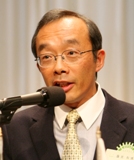��The Future of Public Education��
February 4, 2009
Mr. Kazuhiro Fujiwara,
Former Principal, Suginami Ward Municipal Wada Middle School
 In a mature and complex society in which the sense of values is diversified, what type of social system is important? My conclusion is ��Japan will not become a good mature society unless its basic system is changed in fields of education and medical care, centering on nursing care��.
In a mature and complex society in which the sense of values is diversified, what type of social system is important? My conclusion is ��Japan will not become a good mature society unless its basic system is changed in fields of education and medical care, centering on nursing care��.
��I worked for 5 years as a middle school principal and was the first such person from the private sector to hold such a post in the compulsory education field in the Tokyo Metropolitan Government. My theme was ��How will we achieve changes in public education from the ground up?�� I attempted to make such reform to the full extent without making any changes in the legal system and not creating any special zones under the existing legal system. This was my 5 years as the principal of Wada Junior High School in Tokyo.
��Today, I would like to talk about two matters that are the causes of ��why today��s children and young people lack the ability to communicate��.
��When a child buys goods at a convenience store, there is no need for that child to speak. Recently, the vending machines and elevators can speak. Daily society is designed so that humans are not required to take any proactive steps. We live in an excessively convenient society with an environment in which there is no need to communicate.
Another factor is cell phones and television. Children, on the average, spend 3 hours a day watching television. If time spent playing video games is included, the number is 4 hours. This is about 1,000 hours per child, yearly.
��Compared to this, classroom time in Japanese elementary and junior high schools is 800 hours per year. This includes morality, physical education, and classroom activities. Time spent on 4 subjects in an elementary school and 5 subjects in a junior high school that relate to the acquisition of academic knowledge is half, or 400 hours per year. Within this, roughly 100 hours are spent on learning Japanese in elementary, junior high, and senior high school respectively. I say only 100 hours are spent learning to write and speak Japanese properly. On the other hand, 1,000 hours are spent watching television. It is blatantly obvious which language the children will speak. They will all naturally speak the language of television.
��This is not to say that television is bad. The way in which television is watched or in which television shows present information to people is bad. The same goes for cell phones. It is not the cell phones that are bad but there is no limit placed on method of use.
��A second-year junior high school student sends and receives roughly 200 e-mails per day. This goes from 12 o��clock at night to 2 o��clock in the morning. This is so enjoyable to the students that they are deprived of sleep at night and will be sleepy in the day time instead. Children can also transmit messages and other information easily to strangers. This is intoxicating. If the parent buys a cell phone and provides it to a child, there is no way to prevent this information exchange from happening. When a child is given a cell phone, his/her personality will change. Children with cell phones no longer are attentive to what their teachers are saying. They can get that later via e-mail from their friends. Their levels of concentration decline. They will lose their ability to keep scheduled times, and they will be late. Even if they are late, their location can be known using their cell phone. Getting used to such a sensibility, children will not develop the practice of keeping a promise. ��Ability to compartmentalize and ability to make decisions�� will fade away hand in hand. It should be kept in mind that this is causing serious damage to Japanese society.
��The second problem is the schools�� ��principle of always having the correct answer��. Teachers always want to teach the correct answer. In a mature society, what is demanded is the ability to edit the information rather than the ability to process the information. In a particular situation, the question is whether the optimum solution can be reached instantly by someone, as they employ all of their own knowledge, technology, and experience. Can an appropriate response be made that is acceptable to the responder, and acceptable to the relevant parties? This is the key.
��What is needed is not the ability to come up with the right answer but the ability to use one��s own knowledge, technology, and experience to the fullest to derive the optimum answer in an environment where there is no single right answer. A phenomenon, if looked at in a multi-faceted, compound manner will lead to differing conclusions. This type of education is needed in Japan. I think an education that develops the students�� ability to undertake critical thinking is important.
��For example, in the ��see the world�� class that I proposed, through holding frequent debates, I heightened students�� ability to look at things from multiple angles.
��I hope all of you will the time to go to schools in your area and advise the teachers who teach under the principle of only correct answers, that ��the world is not just about the correct answer��.